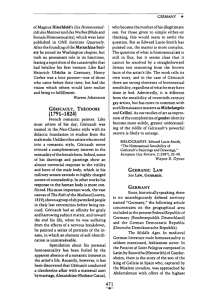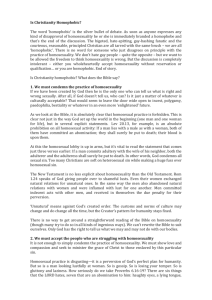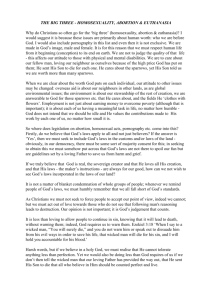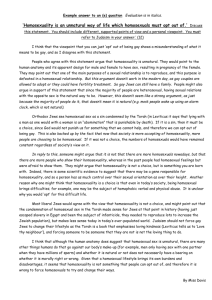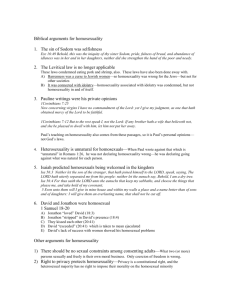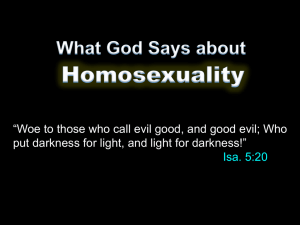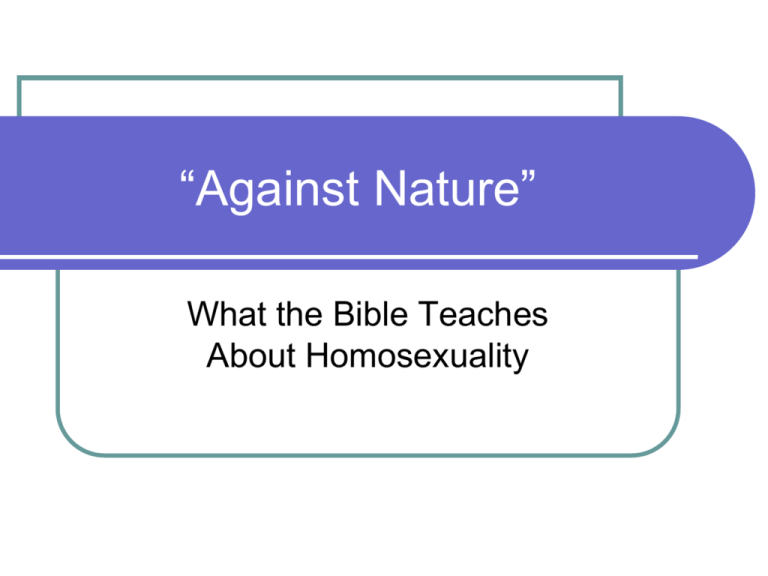
“Against Nature”
What the Bible Teaches
About Homosexuality
How Some “Christians”
Justify Homosexuality
Neglect Bible verses (ignore the clear verses
against homosexuality)
Selective Bible verses (focus in on the verses
about “love” and “forgiveness”)
Reinterpret Bible verses (explain away these
verses as not really condemning
homosexuality)
Substitute Bible verses (appeal to science
and genetics instead of the Bible)
Arguments from the Old Testament
Used to Justify Homosexuality
“‘Help meet’ in Genesis 2:18 means ‘companion’
which is what a homosexual partner is.”
Answer: God created a “female,” a “wife” for
Adam. One must not ignore who God made to be
a “help meet.”
Arguments from the Old Testament
Used to Justify Homosexuality
“The sin of Sodom was inhospitality (Lk. 10:12).”
“The sin of Sodom was pride
(Ezek. 16:49; Isa. 3:9; Jer. 23:14)
“The sin of Sodom was nonconsensual,
homosexual rape.”
Answer: No, the sin was giving “themselves over
to fornication” and going “after strange flesh”
(Jude 7; see 2 Pet. 2:6). Also, “know” (Heb.
yadah) in Gen. 19:5,8 refers to sexual intercourse
(see NIV; and Gen. 4:1,17,25; 24:16; 38:26;
Num. 31:17,18,35; Judg. 11:39; 19:25; 21:11-12;
1 Sam. 1:19; 1 K. 1:4; Mt. 1:23,25; Lk. 1:27,34)
Arguments from the Old Testament
Used to Justify Homosexuality
“Leviticus 18:22 condemns the passive role in
homosexuality, not the active role.”
“Leviticus 18:22 condemns homosexuality in
connection with idolatry.”
Answer: No, this passage is condemning the
homosexual intercourse of both parties (see
Lev. 20:13), not a specific role (posture) of one
party while engage in the intercourse. This
passage speaks of immoral personal behavior,
not just idolatry.
Arguments from the Old Testament
Used to Justify Homosexuality
“Ruth and Naomi were lesbian lovers
(Ruth 1:14-18)
Answer: No, both women were married to men
(Ruth 1:2; 4:13).
Arguments from the Old Testament
Used to Justify Homosexuality
“David and Jonathan had a homosexual
relationship (1 Sam. 18:1-3; 20:30,41).”
Answer: First, “love” and “kiss” in the Bible do not
always imply erotic, passionate, sexual desire.
Second, David was married to Michal, Saul’s
daughter (1 Sam. 18:27-28). He had a problem
with adultery (2 Sam. 11), not homosexuality!
Third, 1 Sam. 20:30 refers to the shame a foolish
son brings to his mother (Prov. 10:1; 15:20;
17:25).
Arguments from the New Testament
Used to Justify Homosexuality
“Jesus said nothing about homosexuality.”
Answer: First, he spoke of the condemnation of
Sodom. Second, he spoke positively about what
God desires for a man and a woman (Mt. 19:3-9).
Third, he spoke through Paul against
homosexuality (1 Cor. 6:9-10; 14:37) [Note: It is
important to point this out to those who follow the
“red letter” edition of the New Testament.] Fourth,
Jesus said nothing directly about incest, rape,
pedophilia, or bestiality? Are these practices ok?
Arguments from the New Testament
Used to Justify Homosexuality
“Jesus said marriage between a male and
female is not for everyone; i.e. a eunuch
(Mt. 19:12); therefore, a man can be with a man;
a woman with a woman.”
Answer: Jesus is contrasting marriage (between
a man and a woman), and celibacy; not
heterosexuality and homosexuality.
Arguments from the New Testament
Used to Justify Homosexuality
“Jesus healed the centurion’s “boy,” but he did
not condemn their homosexual relationship
(Mt. 8:6,8).”
Answer: The Gr. pais is translated “child,”
“maiden,” “son” “young man,” or “servant.” Luke’s
account makes it clear that this “child” was a
“servant” (Lk. 7:2ff). There is no hint of
homosexuality between the two.
Arguments from the New Testament
Used to Justify Homosexuality
“Jesus was a homosexual because it is said that
he “loved” some man (Jn. 11:36; 13:23; 21:20).”
Answer: The “love” (Gr. agape and phileo) of
Jesus toward other men was not errotic,
passionate love (Gr. eros).
Arguments from the New Testament
Used to Justify Homosexuality
“‘Against nature’ in Roman 1:26 simply means
those that are naturally heterosexual trying to be
homosexual; i.e., ‘inversion’.”
Answer: No, the Greek phusis (“nature”) means
“the order of nature.” Paul is talking about that
which is abnormal, perverse and contrary to
God’s created order of things; the way He made
man and woman from the beginning
(Gen. 2:18-25)
Arguments from the New Testament
Used to Justify Homosexuality
“‘Against nature’ in Roman 1:26 is the same in
Romans 11:24, and there it is not condemned.”
Answer: What God did with the Gentiles was
indeed “against nature” (grafting a wild olive
branch onto a domesticated olive tree), but God’s
actions here are not described as immoral as
they are in Romans 1:26-27.
Arguments from the New Testament
Used to Justify Homosexuality
“Paul is simply condemning homosexuality that
is tied with idolatry.”
“Paul is simply condemning perverted
homosexuality (homosexual rape, child
molestation), not the loving, compassionate
kind.”
Answer: No, homosexuality (in Rom. 1 and 1 Cor.
6), and the other sins listed are sinful because
they are immoral. Are the other sins listed here ok
as long as they are not tied with idolatry, and are
the loving, compassionate kind?
Arguments from the New Testament
Used to Justify Homosexuality
“Paul and other Bible writers were culturally
conditioned against homosexuality, and
therefore condemned it.”
Answer: First, Paul and all other Bible writers
were inspired by God directly to write what they
did (Gal. 1:11-17; 2 Tim. 3:16). Second, Peter
was “conditioned” against Gentiles, but was told
to change (Acts 10; Gal. 2:11-14). If being
“conditioned” against homosexuals is wrong, God
would have told Paul so.
Arguments from the New Testament
Used to Justify Homosexuality
“‘Strange’ in Jude 7 refers to sexual intercourse
with angels (Gen. 6:2).”
Answer: No, Jude was talking about the events of
Genesis 18-19 (2 Pet. 2:6-9). There is no record
of sexual intercourse with angels in Sodom.
“Strange” (Gr. heteros) refers to flesh of a
“different” kind; i.e. flesh of another man, and not
a wife (Gen. 2:23-25).
Homosexual “Rights”
Homosexuals have a “right” to…
Know that God regards their activity, not as a
“disease” or “sickness,” but as a sin
(1 Cor. 6:9-10)
Know that they were not born homosexual, but
that they chose their abnormal conduct
(Rom. 1:26-27)
Know that they will suffer the consequences of
their sin (Rom. 1:26-27)
Homosexual “Rights”
Homesexuals have a “right” to…
Know the truth of the gospel (Mk. 16:15-16)
Know that they can repent, change, and stop
their sin (1 Cor. 6:11)
Know that they can be put away by their lawful
spouse for their sinful activity (Mt. 19:9; Jude 7)
Know that they can have a happy heterosexual
marriage (1 Cor. 7:1-2)

